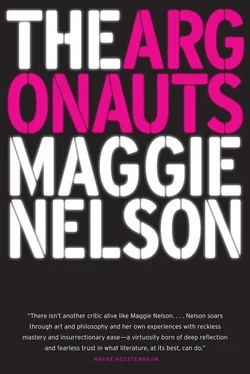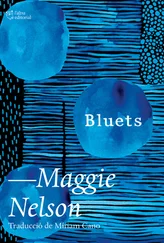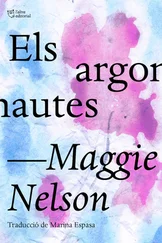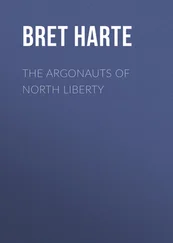Many years ago, Carson gave a lecture at Teachers & Writers in New York City, at which she introduced (to me) the concept of leaving a space empty so that God could rush in. I knew a bit about this concept from my boyfriend at the time, who was big into bonsai. In bonsai you often plant the tree off-center in the pot to make space for the divine. But that night Carson made the concept literary. ( Act so that there is no use in a center: a piece of Steinian wisdom Carson says she tries to impart to her students.) I had never heard of Carson before that night, but the room was packed and everyone else there clearly had. She gave a real lecture, with a Xeroxed slide list of Edward Hopper paintings and everything. She made being a professorial writer seem like the coolest thing you could ever be. I went home fastened to the concept of leaving the center empty for God. It was like stumbling into a tarot reading or AA meeting and hearing the one thing that will keep you going, in heart or art, for years.
Sitting now at my desk in my windowless office, its back wall painted pale blue in commemoration of the sky, I stare at the brackets in the Carson interview and try to enjoy them as markers of that evening from so long ago. But some revelations do not stand.
A student came to my office the other day and showed me an op-ed piece his mother had published in the LA Times , in which she describes her turbulent feelings about his transgender identity. “I want to love the man my daughter has become,” the mother announces at the outset, “but floundering in the torrent of her change and my resistance to it, I fear I’ll never make it across my river of anger and sorrow.”
I talked with the student politely, then came home and raged, reading parts of the mother’s op-ed aloud. “A transgender child brings a parent face to face with death,” the mother laments. “The daughter I had known and loved was gone; a stranger with facial hair and a deep voice had taken her place.” I couldn’t tell what made me more upset — the terms with which the woman was talking about her child, or the fact that she had chosen to publish them in a major newspaper. I told you I was sick of stories in the mainstream media told by comfortably cisgendered folks — presumably “us”—expressing grief over the transitions of others, presumably “them.” (“Where does it fit into the taxonomy of life crises when one person’s liberation is another’s loss?” Molly Haskell asks in her anguished account of her brother’s MTF transition. In case her question is not rhetorical, I’d suggest the following answer: pretty damn low.)
To my surprise, you did not share my outrage. Instead, you raised an eyebrow and reminded me that, just a few years ago, I had expressed related fears, albeit not articulated in exactly the same terms, about the unknown changes that might be wrought by hormones, by surgery.
We were standing in our kitchen when you said this, at the same countertop where I suddenly remembered scouring the teeny print of a Canadian testosterone information pamphlet (Canada is light-years ahead of the United States on this front). I had indeed been trying to figure out, in a sort of teary panic, what about you might change on T, and what would not.
By the time I was scouring the pamphlet, we’d been trying to get pregnant, without success, for over a year. I stayed busy trying to puff up my uterine lining by downing gobs of foul-smelling beige capsules and slick brown pellets from an acupuncturist with “a heavy hand,” that is, one who left my legs covered with bruises; you had begun to lay the groundwork to have top surgery and start injecting T, which causes the uterus to shrivel. The surgery didn’t worry me as much as the T — there’s a certain clarity to excision that hormonal reconfiguration lacks— but part of me still wanted you to keep your chest the way it was. I wanted this for my sake, not yours (which meant it was a desire I would need to dispose of quickly). I also discovered that I harbored some unexamined butch bravado on your behalf, like— You’ve had a beard for years and already pass 90 percent of the time without T, which is more than many folks who want such things can say; isn’t that enough?
Unable to say such things, I focused on the risks of elevated cholesterol and threats to your cardiovascular system that T might cause. My father died of a heart attack at age forty, for no sensible reason (“his heart exploded”); what if I lost you the same way? You were both Geminis. I read the risks aloud ominously, as if, once revealed, they might scare you off T for good. Instead you shrugged, reminded me that T would not put you in a higher risk category than that of bio males not on T. I sputtered a few half-baked Buddhist precepts about the potential unwisdom of making external changes rather than focusing on internal transformation. What if, once you made these big external changes, you still felt just as ill at ease in your body, in the world? As if I did not know that, in the field of gender, there is no charting where the external and the internal begin and end —
Exasperated, you finally said, You think I’m not worried too? Of course I’m worried. What I don’t need is your worry on top of mine. I need your support . I get it, give it.
As it turned out, my fears were unwarranted. Which isn’t to say you haven’t changed. But the biggest change of all has been a measure of peace. The peace is not total, but in the face of a suffocating anxiety, a measure of peace is no small thing. You do feel grief-stricken now, but only that you waited so long, that you had to suffer so acutely for three decades before finally finding some relief. Which is why each time I count the four rungs down on the blue ladder tattooed on your lower back, spread out the skin, push in the nearly-two-inch-long needle, and plunge the golden, oily T into deep muscle mass, I feel certain I am delivering a gift.
And now, after living beside you all these years, and watching your wheel of a mind bring forth an art of pure wildness — as I labor grimly on these sentences, wondering all the while if prose is but the gravestone marking the forsaking of wildness (fidelity to sense-making, to assertion, to argument , however loose) — I’m no longer sure which of us is more at home in the world, which of us more free.
How to explain—“trans” may work well enough as shorthand, but the quickly developing mainstream narrative it evokes (“born in the wrong body,” necessitating an orthopedic pilgrimage between two fixed destinations) is useless for some — but partially, or even profoundly, useful for others? That for some, “transitioning” may mean leaving one gender entirely behind, while for others — like Harry, who is happy to identify as a butch on T — it doesn’t? I’m not on my way anywhere , Harry sometimes tells inquirers. How to explain, in a culture frantic for resolution, that sometimes the shit stays messy? I do not want the female gender that has been assigned to me at birth. Neither do I want the male gender that transsexual medicine can furnish and that the state will award me if I behave in the right way. I don’t want any of it . How to explain that for some, or for some at some times, this irresolution is OK — desirable, even (e.g., “gender hackers”) — whereas for others, or for others at some times, it stays a source of conflict or grief? How does one get across the fact that the best way to find out how people feel about their gender or their sexuality — or anything else, really — is to listen to what they tell you, and to try to treat them accordingly, without shellacking over their version of reality with yours?
The presumptuousness of it all. On the one hand, the Aristotelian, perhaps evolutionary need to put everything into categories— predator, twilight, edible —on the other, the need to pay homage to the transitive, the flight, the great soup of being in which we actually live. Becoming , Deleuze and Guattari called this flight: becoming-animal, becoming-woman, becoming-molecular. A becoming in which one never becomes, a becoming whose rule is neither evolution nor asymptote but a certain turning, a certain turning inward, turning into my own / turning on in / to my own self / at last / turning out of the / white cage, turning out of the / lady cage / turning at last .
Читать дальше












